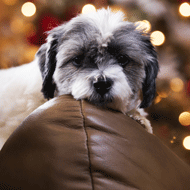‘Cocktail party’ effect also applies to dogs - study

Dogs responded to their own name when it was spoken at the same volume or louder than background noise.
The ‘cocktail party effect’ which allows humans to filter out background noise and focus on one conversation in a noisy room, also applies to dogs, a study has found.
Researchers from the University of Maryland discovered that dogs responded to their own name when it was spoken at the same volume or louder than a mashed-up recording of women reading book passages.
Dogs only failed to respond when the background noise became louder than the name call. Researchers say this has important implications for those who work with dogs, particularly service animals, as handlers may need to raise their voices or move closer to the animal when surrounding noise could drown them out.
“Recognising that dogs may have trouble in those settings is worth knowing,” said lead author Rochelle Newman.
Scientists also discovered that working dogs, such as search and rescue or explosives dogs, are more able to recognise their own name in crowded environments than companion animals.
In addition, the study revealed that, when it comes to the cocktail party effect, dogs are able to outperform human infants, who generally do not respond when stimuli are at equal volumes.
According to researchers, the findings indicate that human infants struggle to detect their name in noisy environments because of their developmental stage, rather than a lack of language skills.
The findings have been published in the journal Animal Cognition.



 The latest
The latest